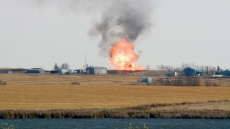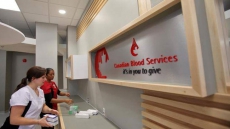VICTORIA - British Columbia's medical health officer says current infection-control guidelines are appropriate and the province is prepared if someone tests positive for Ebola.
However, Dr. Perry Kendall told reporters on Tuesday that the infection of a health-care worker in Texas calls for B.C. hospitals to reassess infection-control practices.
"We need to assure our health-care professionals on the front line that they will have the tools that they need and will feel comfortable and confident in using them," he said.
His statement comes after the B.C. Nurses' Union sent a letter to Mary Ackenhusen, the president of Vancouver Coastal Health. The union wrote that the authority wasn't ready to respond to any Ebola cases and members said they had not been trained to care for such patients.
"On paper things may look good, however we have been canvassing our members on designated units who advise ... that it is simply not the case," said the letter from Gayle Duteil, president of the union.
"Nurses and their families are legitimately scared. If the health system wants our members to put themselves at risk of exposure to a deadly disease, we expect that every reasonable precaution be put in place on a priority basis."
The union outlined a 10-point plan that it believes requires attention. The plan includes training around assessment of patients, proper procedures for putting on and removing personal protective gear, handling waste, and guidance for handling deceased patients.
Given the authority's lack of preparedness, we have no choice but to advise our members that they should only provide care to patients with suspected or confirmed cases of Ebola if they have been provided with the proper training and equipment, the letter said.
Three people who were suspected of having the Ebola virus in B.C. have tested negative, Kendall said.
Kendall said he has issued directions to ensure that the B.C. health-care system has the capacity and expertise to deal with such a crisis
"Our first priority will be on establishing the processes to familiarize or to refamiliarize our health-care workers with personal protective equipment, so that if they have to use it, they can do so safely and with confidence.
Kendall noted that this isn't the first time the health-care system has been confronted with a deadly disease.
People were terrified of exposure to HIV during the 1980s, he noted.
"People would not treat people with the disease. They refused to treat them. Yet we worked out way through that one."




